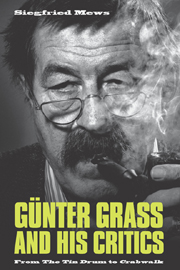Book contents
- Frontmatter
- Contents
- List of Abbreviations
- Introduction
- Part 1 Danzig, Center of the Universe
- Part 2 From Danzig to the Global Stage: Grass's Fiction of the 1970s and 1980s
- 5 Örtlich betäubt / Local Anaesthetic
- 6 Aus dem Tagebuch einer Schnecke / From the Diary of a Snail
- 7 Der Butt / The Flounder
- 8 Das Treffen in Telgte / The Meeting at Telgte
- 9 Kopfgeburten oder Die Deutschen sterben aus / Headbirths or The Germans Are Dying Out
- 10 Die Rättin / The Rat
- 11 Zunge zeigen / Show Your Tongue
- Part 3 After Reunification: Old Problems and New Beginnings
- Epilogue
- Works Cited
- Index
5 - Örtlich betäubt / Local Anaesthetic
from Part 2 - From Danzig to the Global Stage: Grass's Fiction of the 1970s and 1980s
Published online by Cambridge University Press: 05 February 2013
- Frontmatter
- Contents
- List of Abbreviations
- Introduction
- Part 1 Danzig, Center of the Universe
- Part 2 From Danzig to the Global Stage: Grass's Fiction of the 1970s and 1980s
- 5 Örtlich betäubt / Local Anaesthetic
- 6 Aus dem Tagebuch einer Schnecke / From the Diary of a Snail
- 7 Der Butt / The Flounder
- 8 Das Treffen in Telgte / The Meeting at Telgte
- 9 Kopfgeburten oder Die Deutschen sterben aus / Headbirths or The Germans Are Dying Out
- 10 Die Rättin / The Rat
- 11 Zunge zeigen / Show Your Tongue
- Part 3 After Reunification: Old Problems and New Beginnings
- Epilogue
- Works Cited
- Index
Summary
A Farewell to Danzig
THE PUBLICATION OF ÖRTLICH BETÜUBT in the summer of 1969 was preceded by the (West) Berlin premiere of Grass's play Davor (WA 8:479–555; translated as Max, 1972) in February of the same year. Davor essentially corresponds to the second part of the novel, in which the secondary-school teacher Eberhard Starusch — nicknamed “Old Hardy” by his students — seeks to dissuade his favorite student Philipp Scherbaum from going through with his planned protest, which consists of dousing his beloved dog Max with gasoline for the purpose of a public immolation. Scherbaum's drastic and cruel measure is intended to sharpen dog-loving (West) Berliners' awareness about the use of napalm by American troops in Vietnam. On the one hand, it has been pointed out that by 1969 Grass had become firmly established on the literary scene (see H. L. Arnold 1997, 111) so that the mere announcement of a forthcoming new work by the author of Die Blechtrommel signified an important literary event. On the other, the mixed to poor reviews that Davor had received tended to diminish readers' and critics' high expectations. Yet the coincidence of the book's publication date and the beginning of Grass's renewed active involvement in politics, which resulted in his speaking at 190 rallies during the 1969 election campaign on behalf of the Social Democratic Party (SPD) and Willy Brandt, candidate for Chancellor of the Federal Republic, served to draw additional attention to the novel. His literary fame caused the concerned citizen Grass's political interventions to be widely noticed; he was propelled from the comparative obscurity of the cultural section, the Feuilleton, of the West German press to its front pages.
- Type
- Chapter
- Information
- Günter Grass and his CriticsFrom 'The Tin Drum' to 'Crabwalk', pp. 103 - 119Publisher: Boydell & BrewerPrint publication year: 2008



